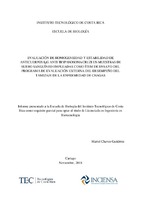Evaluación de homogeneidad y estabilidad de anticuerpos IgG anti Trypanosoma Cruzi en muestras de suero sanguíneo empleadas como ítem de ensayo del programa de evaluación externa del desempeño del Tamizaje de la enfermedad de Chagas.
Resumen
Chagas disease is an American continent endemic illness, caused by the protozoan
Trypanosoma cruzi. Diagnosis is mainly based upon serologic methodologies such as
Chemiluminescent Microparticle Immunoassay (CMIA), which is employed in Costa Rica for
donated blood screening. In order to perform a continuous monitoring of blood banks
performance, the Chagas Disease Screening Evaluation Program proficiency test has been
established. The objective of the present investigation was to assess the homogeneity and
stability of proficiency test items according to INTE-ISO/IEC 17043:2010 standard. For that
purpose fulfillment, experimental designs and testing methods were carried out following
INTE/ISO 13528:2016 standard guidelines. In quantitative terms, it was determined that the
analyzed sera had some heterogeneity degree, as well as insufficient stability regarding the
analyte of interest which corresponds to IgG class anti-T. cruzi antibodies. Given the
qualitative nature of ARCHITECT Chagas immunoassay and the fact that the samples
demonstrated no significant reactivity changes, the proficiency test items were accepted as
suitable for evaluation of participant performance.
Descripción
Proyecto de Graduación (Licenciatura en Ingeniería en Biotecnología) Instituto Tecnológico de Costa Rica, Escuela de Biología, 2018.


